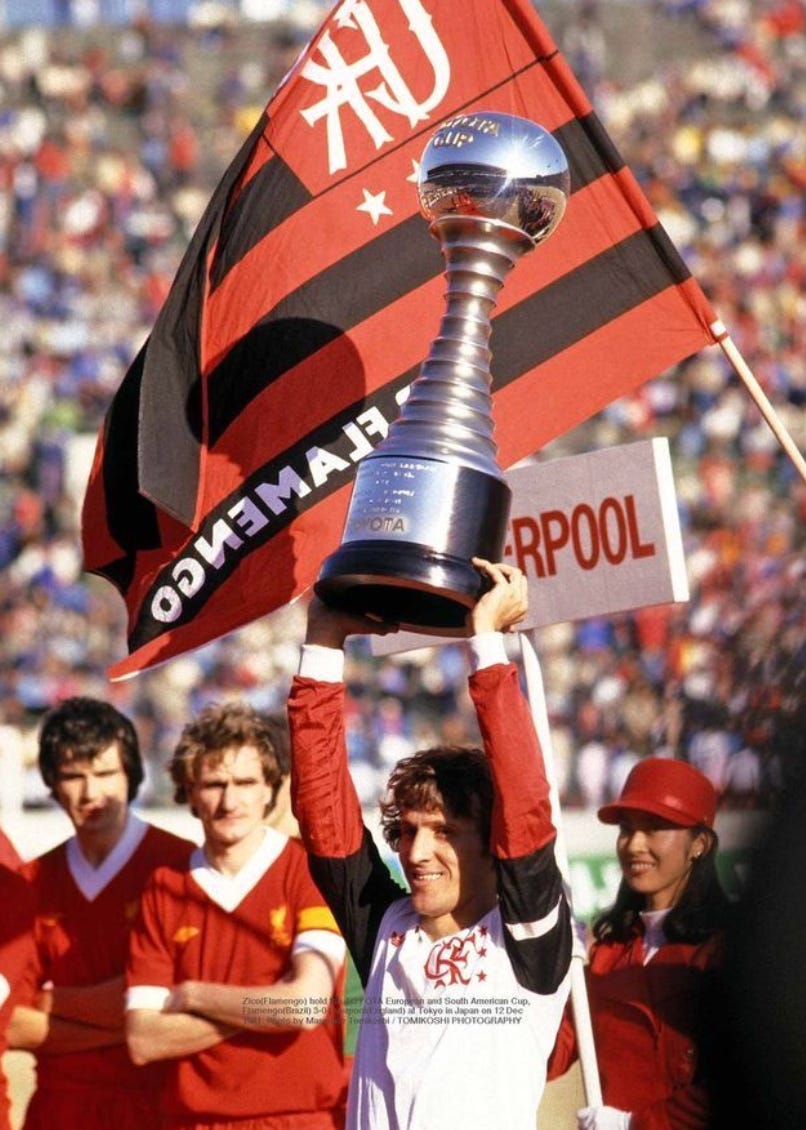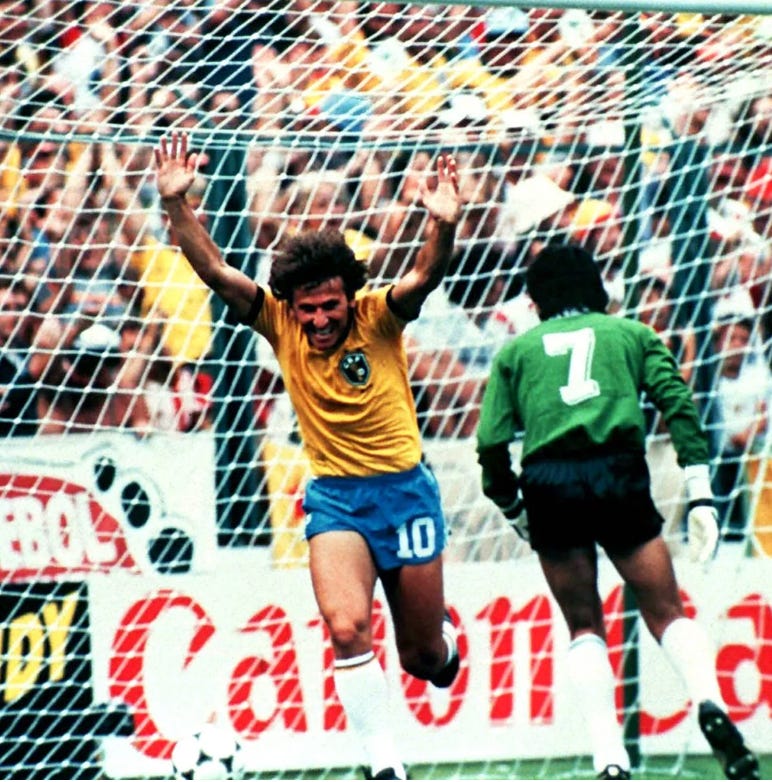Zico: The Maestro Who Played Like Light
How a boy from Rio became the beating heart of beautiful football.
Each week I write to support coaches and fans of the beautiful game to see beyond simply tactics and into the whole human experience that the game evokes. This is The Art of Football Project.
Past articles you might like:
César Luis Menotti: The Philosopher Who Coached with His Heart
He Told Me to F##k Off… So I Gave Him the Captain’s Armband
Paul Gascoigne: The Genius Who Couldn't Be Tamed
____________________________________________________________________________
I was only 9 years old. How could I have known?
Football was watched in spurts of weekend morning roundups with Graham Leggat, the transplanted Englishman at the helm of the legendary show, Soccer Saturday, that we set the alarm for. My team, Liverpool—and quite obviously, as a young lad I was a follower of the best at the time—were champions of England and European giants, having just dismantled the rest of the continent and defeated Real Madrid 1–0 in Paris.
Onwards they went to what was then called the Intercontinental Cup. A tournament of the best continental clubs in the world. For much of Europe, it was considered a waltz in the park. For South America, a dream to win and an opportunity to showcase their tremendous talent to the more lucrative European clubs.
Liverpool were set to face Flamengo in the final after both had dispatched their semi-final opponents with relative ease. For Liverpool, this was to be a simple task, more like a holiday. Show up, run around, walk home with the trophy and the title of greatest club in the world. At that time, they had won a third European Cup in just a few years and were undisputed kings of football, at least in the European media.
I had never seen South American club opposition in any way, but we had heard about Brazil because of Pelé. I reiterate: I was 9. Pelé was known to us through the New York Cosmos of the NASL, a pretty big deal in world football at the time, and of course through the mighty Brazil, who had won the World Cup multiple times—a dream for every kid.
Brazil, in their gold jerseys, were the epitome of cool. But nobody I knew showed up to pick-up football trying to be a player from a South American club team. We barely knew the names.
Enter Flamengo. A squad of single-name players few of us had heard of, facing the might of Europe in Japan in front of 62,000 fans, with the chance to be crowned the greatest club in the world. To us, they were distant cousins of the national team—mysterious, magical, but surely not better than The Reds.
And then I saw something that changed me.
A maestro ran the match from start to finish. Flicks and tricks. Tempo and slide-rule passes that unlocked doors no one else could see. My mind was stretched. It was like looking out from the top of a tall mountain, pure awe.
His name was Arthur Antunes Coimbra.
They called him Zico.
The conductor of a mighty 3-0 victory for Joga Bonito and from that day forward, I would follow his journey as much as I could.
To watch the full match go to Footballia here.
Zico was raised in Rio de Janeiro's Quintino Bocaiuva neighborhood. He was a small boy but learned the game playing futsal and street football against older boys. His early mentor was Celso Garcia, a local radio host who recognized the boy's immense talent and helped get him into Flamengo's youth system.
At Flamengo, Zico would go on to become the architect of their most successful era. He wasn’t built like a star—slight in frame, unassuming in presence—but his game was filled with elegance, intelligence, and imagination. He was often referred to as the “White Pelé,” but that label never captured the poetry of his own style.
“Throughout the years the one player that comes closest to me is Zico.”
- Pele
As an attacking midfielder wearing the famous number 10 shirt, Zico had the freedom to orchestrate the game. He didn’t run the show; he painted it. His vision and technique made space where there was none. His goals were like brushstrokes, sudden and effortless.
When Tele Santana brought him into the Brazil national team, it was a perfect marriage of art and ideology. Brazil’s 1982 squad is still talked about as one of the most beautiful teams to never win the World Cup. Zico stood at the heart of it—alongside Sócrates, Falcão, and Éder—offering a brand of football that felt more like jazz than war.
I was 10 years old when I watched that Brazil team play. It was the first World Cup I remember vividly. At the time, you supported your ancestry’s nation. Once they were knocked out, you cheered for Brazil. Everyone did. You couldn’t not.
Zico was the reason.
His creativity wasn’t just flair for flair’s sake. It was functional genius. A dummy run to pull defenders. A chipped ball when others would blast it. He understood the geometry of the pitch in ways that made defenders dizzy.
“He was more complete.”
- Tite (former Brazilian national team coach) talks about Zico being better than Maradona and Messi (always up for debate but those who watched him regard him in this type of conversation.)
Even after his playing career, Zico’s legacy continued, coaching, mentoring, and promoting football across continents. But it was his time with Flamengo and Brazil that left a mark on football’s soul.
He showed us that football could be beautiful without needing to be pragmatic. That playing with joy didn’t mean you weren’t serious. That artistry and effectiveness were not opposites.
Zico reminded us that you don’t need to scream to be heard.
You don’t need to be tall to stand out.
He encapsulated what Brazilian culture and Brazilian football was.
He played like light; quick, brilliant, impossible to hold.
And for that, every young player with a dream and a ball should know his name.
The Art of Football Project
Where football becomes human.
For coaches and fans seeking the soul beyond systems, tactics, and data.
If you enjoyed this post…please do me a favour and share with coaches or players in your world. I’d greatly appreciate it.
✅ Subscribe to The Art of Football
📩 Forward to a fellow coach
Or drop me a note. I’d love to hear from you.




Enjoyed reading this, thanks. Read about him and the game once, but haven't watched any of his matches or videos. Thanks for sharing those.